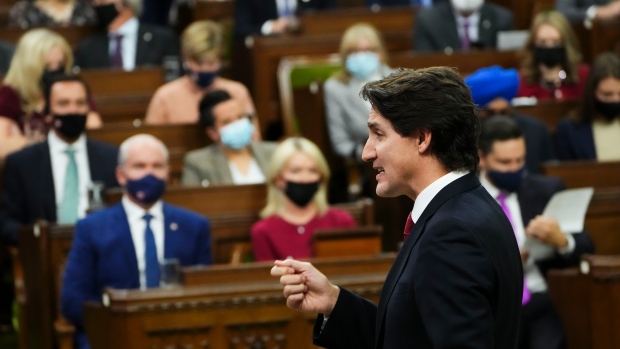Don Martin: New question period sounds like the old, so why did we have an election?

OTTAWA — You tune into the first question period after the Great Reset to see an in-person House of Commons for the first time since March 2020 with faint hopes it would be different.
Perhaps, you try to delude yourself, it could be possible the tragic B.C. flooding emergency would sober up the discourse and calm down the usual histrionics.
Or that Prime Minister Justin Trudeau, who blasted an opposition focused on “personal attacks, on partisan attacks, on spreading mud as broadly as they can” during his final pre-election Commons appearance last June, would himself rise above the low standard he lamented in others.
Or, if it’s not asking too much, that real-life Canadian concerns — namely inflation and labour shortages — would be the central focus over government legacy projects like $10-a-day child care, which may or may not roll out in the years ahead, and affordable housing, which will never happen.
Sadly, no to all of the above.
The “newly reconstituted” era, as Trudeau called it, dawned Wednesday with the same-old, same-old mishmash of hyperventilating theatrics and selective deafness to serious questions from leaders delivering practiced lines they’d rehearsed two hours earlier.
Before the hour was over, oft-ignored Speaker Anthony Rota had pleaded for quiet decorum more than half a dozen times as he lost track of the conversation in the racket.
All in all, it was a spectacle like everything we’ve seen before. Only noisier.
Trudeau was asked about inflation and why Tuesday’s throne speech only mentioned it once. He shrugged it off as a global problem and countered with his daycare plan.
He was asked about labour shortages weighing down the economic recovery, a problem he neglected to mention in the Drone from the Throne. He countered that a boost in immigration would help.
He was asked to guess the price of bacon, bread, gas fill-ups and lumber. Not having a clue, he shrugged it off as a ‘cheap political trick’ and wisely defaulted to what he believes are primary concerns of all voters, namely child care spaces and housing prices.
He was politely asked by the Bloc Quebecois if he would consider a health care funding summit. Trudeau said he already had a plan.
The NDP leader demanded the government produce concrete action on climate change. Trudeau said the voters thumbed-up his better plan in the election.
You get the drift.
All the most irritating antics of the prime minister were back on even-more-irritating-than-usual display as he disparaged all suggestions, brushed aside all opportunities for informative answers and argued that any priorities which aren’t his priorities aren’t worth discussing.
For my money, Trudeau took far more cheap shots at the Conservatives than he got back from them, even as he slammed the irritants across the aisle for “silly schoolyard insults.”
But the Conservatives are not without sin, having jabbed home multiple mentions of Trudeau’s Tofino surfing getaway and his confessed disinterest in monetary policy while christening the current price spiral as Justin-flation.
It’s unfortunate how the culmination of so much time and effort spent platform-building and quality candidate-recruitment resulting in millions of doors being knocked on came down to this: A $600-million election bill for a House of Commons in the same alignment built around the silliness of a question period which wouldn’t have looked out of place long before the election.
It might have been a rude welcome for rookie MPs to find themselves seated in a House divided by such instant rancour that unity of purpose, even now as the west and east coasts are swamped by the deep-rooting of climate change, was missing in action on their very first day.
But they should’ve known what was coming. After all, this 44th Parliament is simply a copy-and-paste of the 43rd. Which copied the 42nd. And repeated the 41st…
That’s the bottom line.
*** This article has been archived for your research. The original version from CTV News can be found here ***

